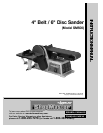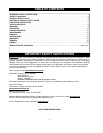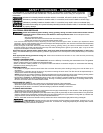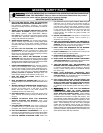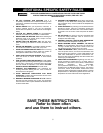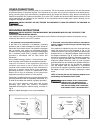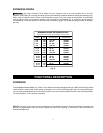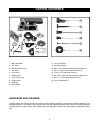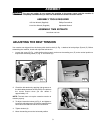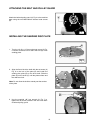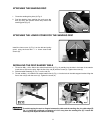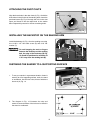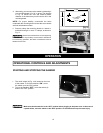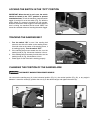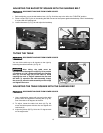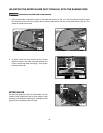
5
ADDITIONAL SPECIFIC SAFETY RULES
1. DO NOT OPERATE THIS MACHINE until it is
completely assembled and installed according to the
instructions. A machine incorrectly assembled can cause
serious injury.
2. OBTAIN ADVICE from your supervisor, instructor, or
another qualified person if you are not thoroughly
familiar with the operation of this machine. Knowledge is
safety.
3. FOLLOW A L L WIRING CODES and recommended
electrical connections to prevent shock or electrocution.
4. NEVER TURN THE MACHINE “ON” before clearing the
table/work area of all objects (tools, scraps of wood,
etc.). Flying debris is dangerous.
5. NEVER TURN THE MACHINE “ON” with the work-
piece contacting the abrasive surface. Kickback can
occur.
6. SECURE THE MACHINE to a supporting surface. Vibration
can cause the machine to slide, walk, or tip over.
7. COVER THE POWER TAKE-OFF SHAFT when not using
accessories. Unguarded rotating shafts can create an
entanglement hazard which can result in injury.
8. USE A DUST COLLECTION SYSTEM. Some types of
wood are known to cause disease or other health
problems.
9. FIRE HAZARD CLEAN THE MACHINE and dust collector
t h o r o u g h ly when processing different types of workpieces
(wood, steel, or aluminum). Combining wood and metal
dust can create an explosion or fire hazard. DO NOT
SAND OR POLISH MAGNESIUM. Fire will result.
10. PREVENT THE WORKPIECE from contacting the
sanding belt before starting the tool. Loss of control of
the workpiece is dangerous.
11. AVOID AW K WARD OPERATIONS AND HAND
POSITIONS. A sudden slip could cause a hand to move
into the abrasive disc or belt.
12. M A I N TAIN A MAXIMUM CLEARANCE OF 1/16" between
the table and the abrasive disc or belt. The workpiece
could be drawn into the space between the abrasive disc
or belt and the table.
13. SUPPORT THE WORKPIECE firmly with a miter gauge,
backstop, or work table when sanding with a belt. Hold
the workpiece firmly. Loss of control of the workpiece can
result in injury.
14. AVOID KICKBACK by sanding in accordance with the
directional arrows. Feed the workpiece against the
downward rotation side of the disc or the forward rotation
of the belt. Loss of control of the workpiece can result in
i n j u r y.
15. DO NOT SAND very small or very thin workpieces that
cannot be safely controlled. Loss of control of the
workpiece can result in injury.
16. P R O P E R LY SUPPORT LONG OR WIDE W O R K P I E C E S .
Loss of control of the workpiece is dan-gerous.
17. NEVER PERFORM LAY O U T, A S S E M B LY, OR SET-UP
WORK on the table/work area when the machine is
running. A sudden slip could cause a hand to move into
the abrasive surface. Severe injury can result.
18. TURN THE MACHINE “OFF”, disconnect the machine
from the power source, and clean the table/work area
before leaving the machine. LOCK THE SWITCH IN
THE “OFF” POSITION to prevent unauthorized use.
Some-one else might accidentally start the machine and
cause injury to themselves.
19. ADDITIONAL INFORMATION regarding the safe and
proper operation of power tools (i.e. a safety video) is
available from the Power Tool Institute, 1300 Sumner
Avenue, Cleveland, OH 4411 5 - 2 8 5 1
( w w w.powertoolinstitute.com). Information is also
available from the National Safety Council, 1121 Spring
Lake Drive, Itasca, IL 60143-3201. Please refer to the
American National Standards Institute ANSI 01.1 Safety
Requirements for Woodworking Machines and the U.S.
Department of Labor OSHA 1910.213 Regulations.
READ AND UNDERSTAND ALL INSTRUCTIONS. FAILURE TO FOLLOW THESE
INSTRUCTIONS MAY RESULT IN ELECTRICAL SHOCK, FIRE AND / OR
SERIOUS INJURY.
SAVE THESE INSTRUCTIONS.
Refer to them often
and use them to instruct others.



